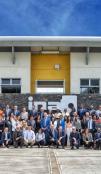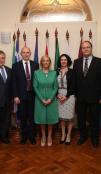EU Annual Report on Human Rights and Democracy in the World 2023 - Uruguay

Eastern Republic of Uruguay
Overview of the human rights and democracy situation: Uruguay is a like-minded partner with strong democratic institutions and values. In 2023, it developed its first National Human Rights Plan (2023-2027) which establishes the bases and programmatic guidelines for the incorporation of the human rights approach to public policies, as well as for regulatory and institutional adaptation in this area. Human rights organisations enjoy good legal and political environment to operate in. Nevertheless, these organisations have been reporting less access to public financing and openness of the government to dialogue with civil society.
The uptrend in homicides and the high rate of domestic violence against women and girls remains a serious concern. In 2023, the UN Experts of the Committee on the Elimination of Discrimination against Women (CEDAW) recognised the country’s commitment to implementing the 1979 Convention on the Elimination of all Forms of Discrimination against Women: approval of the comprehensive law on gender violence, decriminalisation of the voluntary interruption of pregnancy, the “Trans law”, and the law on equal marriage. The laws on trafficking and sexual and workplace harassment were also approved. However, these texts alone did not change the cultural bias, underlining the necessity of allocating appropriate resources and plans for education, implementation and enforcement. Uruguay has one of the largest prison populations per capita globally and the first in South America. High rates of institutional and interpersonal violence persist, as well as homicides and suicides. Social reintegration of prisoners remains a pending issue; the recidivism rate in Uruguay is around 65%. Discrimination against afro-descendants, LGBTI community, immigrants and other minorities continues to be present in the society (particularly in income, education, health and work opportunities) despite legislative and policy initiatives.
EU action – key focus areas: The EU priories focused on: (i) combatting all forms of sexual and gender-based violence against women and girls, promoting gender equality, combatting discrimination and increasing political participation of women; (ii) promoting the protection of children from all forms of violence, abuse and neglect; (iii) raising awareness about the poor living conditions of people deprived of liberty, to encourage their economic and social reinsertion and to strengthen the civil society organisations (CSOs) on the matter; (iv) promoting the protection, access and use of natural resources, supporting communities affected by environment and climate change and monitoring by NGOs, and to promote citizen’s participation and the access to environmental justice.
In 2023, the EUDEL launched the sixth edition of the EU Human Rights Award to give greater visibility to the activities carried out by civil society in Uruguay and to commemorate the 75th anniversary of Universal Declaration of Human Rights. The award (USD 5,000) was granted to DIANOVA Uruguay, committed to help people suffering mental health problems and addictions.
Three ongoing EU-funded projects under the Human Rights and Democracy Thematic Programme will strengthen the capacity of civil society organisations to influence public policies on gender-based violence, to generate knowledge about gender-based violence as a risk factor in the suicides of women, children and adolescents, to promote the respect of women’s rights and to empower female victims of domestic violence through their reintegration in the labour market and to develop their effective access to justice. The EU is also providing technical assistance to the National Women Institute with the cooperation of UN Women. To this end, a contract of EUR 325,000 was signed under the Human Rights and Democracy Thematic Programme.
Concerning the right to access sustainable natural resources and a sound environment, three projects were awarded in 2023 to CSOs, focused on promoting agro-ecology and protecting biodiversity in Uruguay (total budget EUR 1,675,000).
EU bilateral political engagement: Uruguay hosted in September 2023 the Second World Summit of the Parliamentary Committees of the Future, dedicated to Artificial Intelligence (AI). The three-day Summit, co-funded by the EU, explored the threats and opportunities posed by the ongoing development of AI, with a focus on the critical role of parliaments and anticipatory parliamentary practice in governance. European Parliament was represented by its Vice-President and (virtually) by the President of the Special Commission on Artificial Intelligence in the Digital Age, MEP Dragoş Tudorache.
As part of its efforts to support the participation of Civil Society Organisations in the preparation of the 4th cycle of Uruguay's Universal Periodic Review in May 2024, the EU Delegation organised a meeting with Member States’ Embassies and various NGOs.
EU financial engagement: The total value of the EU Delegation´s support to civil society organisations in on-going (2020-2024) projects currently amounts EUR 5,613,213 of which EUR 1,971,000 (35%), specifically promote women’s rights and fight against gender violence. Some EU Member States’ embassies also provide financing for human right projects.
Multilateral context: Uruguay is committed to multilateralism. The country is a UN founding member and is one of the world largest per capita contributors of forces to UN peacekeeping missions. Uruguay ratified the United Nations Convention on International Settlement Agreements Resulting from Mediation, entering into force in September 2023. The EU Delegation and the EU Member States Embassies conducted joint demarches about the Russian invasion to Ukraine and many other issues of multilateral relevance. Those demarches, as well as those related to the UNGA Third Committee, confirmed that Uruguay’s positions are in general on the same line as the EU’s.





